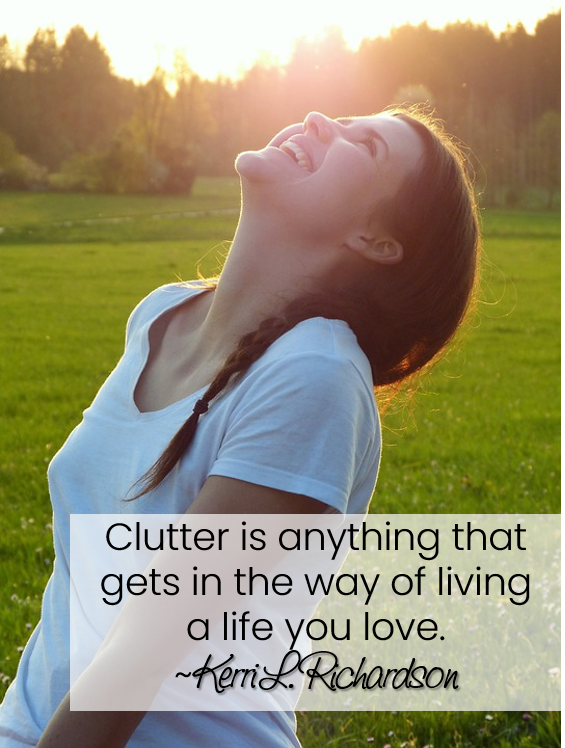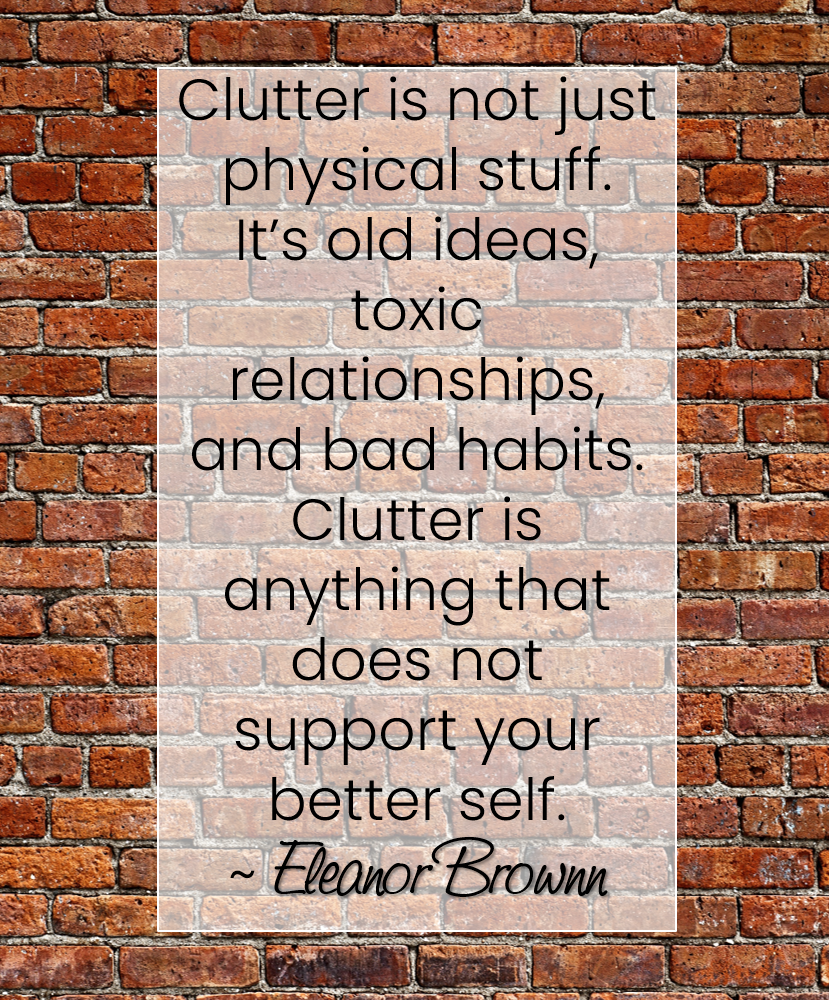|
|
|
AFFILIATE DISCLOSURE: This post contains affiliate links. This just means that there are product suggestions included within the text. Should you click on one of the links and decide to make a purchase, I will receive a small commission. I only suggest products I love and have experience with that are directly related to the content in this post. You can view my Disclosure Statement for more information. Thank you for your support! When you hear the word clutter, what comes to mind? If you're like most people, physical clutter is the thing you think of first. It may even be the only thing. In truth, though, clutter can take many forms. Kerri L. Richardson, professional organizer and author of the book What Your Clutter Is Trying To Tell You, defines clutter as follows: When thought of in this way, many other types of clutter become evident. The first step to decluttering is to uncover your clutter. In other words, to truly conquer your clutter, you have to identify it in all its forms in order to root it out and remove it from your life.
Not all clutter is visible. While visible clutter (which I will refer to as physical clutter) is the most obvious, it may not be the most limiting or the most impactful form of clutter in a person's life. Clutter can be mental, emotional, or spiritual as well. While generally unseen, these types of clutter (sometimes referred to as "baggage") can have a radical impact on quality of life and overall well-being.
The clutter that is conscious is the clutter that you recognize and acknowledge. When you encounter conscious clutter, it elicits a reaction. The reaction can be both intellectual and physical in nature. For example, seeing a cluttered countertop might cause your muscles to tense or your heartrate to increase. It might also conjur negative thoughts and emotions. While most conscious clutter is physical, not all physical clutter is conscious. It's possible for a person to become so used to physical clutter that he or she develops a sort of clutter blindness. Unconcious clutter can also evoke physical and emotional signs of stress. The difference lies in the fact that unconcious clutter is not recognized as clutter. It can be anything in your life that is getting in your way, preventing your progress, or impacting your peace and happiness. This description of clutter by inspirational writer Eleanor Brownn perfectly describes what I am referring to as unconscious clutter.
Now that we have expanded our understanding of clutter, let's take a closer look at the different kinds of clutter.
Physical clutter is stuff. It takes up space in the physical world. When searching for a definition of clutter, you will find that it is often associated with disorder, confusion, and excess. Physical clutter refers to those items that are unused, unneeded, and/or unwanted but held onto for one reason or another. It can also refer to items that are out of place or have no permanent home. It's interesting to note that the reasons behind the accumulation and retention of physical clutter could be considered a form of clutter in and of themselves. I'm thinking here of the guilt or fear that often cause us to hold onto things that really don't have a place in our lives. Clearing Away Physical Clutter: This website is dedicated largely to the concept of dealing with physical clutter, so I won't go into tremendous depth here. Instead, I will just offer a few simple suggestions for getting started.
Mental clutter accumulates when we have too much to do or to think about. As a result, our brains become overloaded making it difficult to focus, problem solve, and be productive. This leads to stress, anxiety, and frustration. If you are like me, you probably find yourself thinking most clearly during down times such as while driving, taking a shower, exercising, or laying in bed first thing in the morning. This is because these simple, semi-automatic activities require very little 'brain power', thus allowing our minds to focus in on a particular problem that's been troubling us or to suddenly wow us with a flash of brilliance or creative genius. The problem is, capturing these light bulb moments can be tricky when one is in the middle of traffic or dripping wet. The good news is, there are things we can do to recreate the circumstances that foster mental clarity. Clearing Away Mental Clutter:
Emotional clutter comes as a result of negative thoughts and feelings that weigh us down and limit our progress. Guilt, fear, anger, resentment, self-doubt, jealousy, anxiety, and grief are some of the biggest culprits. Despite their damning effect on us (or perhaps because of it), we often cling to these emotions, and the sources from which they spring, with self-destructive determination. What are the sources of emotional clutter? Some examples include:
The key to overcoming emotional clutter is to develop emotional resilience, or the ability to adjust or recover when faced with change, setbacks, disappointments, and other challenges that life presents. Clearing Away Emotional Clutter:
Integrity is often associated with honesty. That is certainly an important aspect of integrity, but there is more to this concept than mere veracity. Integrity also means whole, sound, undiminished, unimpaired. When applied to one's character, I think a good way to define integrity is living in such a way that your actions are consistent with your beliefs. In other words, integrity is being true to yourself. When we make choices that we know are not an accurate reflection of how we believe we should live our lives, our integrity is weakened. Much like a building that is structurally unsound, poor choices can leave us feeling unbalanced, out of alignment, and just off. It could be as serious as committing a crime or breaking a vow or as simple as being unkind or eating something that's bad for you. It all depends on what matters to you and the person you want to be. Whatever the case, the more we live out of sync with the things we believe to be right, the more spiritual clutter amasses in our lives. Clearing Away Spiritual Clutter:
Clutter can be overwhelming. When it comes to physical clutter, clients often tell me, "I don't know where to start." The same can be true for all forms of clutter, be it mental, emotional, or spiritual. My response to this statement is always the same, and it holds true no matter what type of clutter you are dealing with. It doesn't matter where you start. Just start, and in doing so, you will build confidence and momentum that will carry you through to the end. I wish you every success in uncovering and conquering your clutter. It is worth the effort. You can do it. I believe in you. If you're feeling nervous about uncovering your clutter, contact me. The process is always easier when you have support.
10 Comments
3/29/2021 08:22:15 am
I totally agree, there are many things that clutter our lives. Thank you for spelling it out for us. I'm definitely sharing this with my audience.
Reply
3/29/2021 08:33:31 am
I relate to your point about clutter blindness. It honestly doesn't take long to stop seeing it. I just become accustomed to having a stack or pile. It takes intentionality to keep putting things away. It is worth it, though. It builds up so fast!!!
Reply
3/30/2021 01:20:40 am
This is so wise, and almost entirely comprehensive. To all of your types of clutter, I add one more: temporal clutter. You're right, people think most about the tangible stuff, and it's important to look at the mental, emotional, and spiritual clutter. But related to all of those is that mean old temporal clutter -- the overload of tasks related to worn-out interpersonal obligations, the labor required to keep the tangible clutter maintained, the event and activity clutter related to personal identities that have long been outgrown. As people follow your advice for addressing the tangible, mental, emotional, and spiritual clutter, they should look at their daily habits and schedules to eliminate all the things in service to someone or something other than themselves and their own goals. Great post!
Reply
3/30/2021 09:25:20 am
Excellent point, Julie! I totally agree that temporal clutter belongs by on this list. Thank you for bringing it up. I wish that I had thought to add it. I may have to update the page!
Reply
3/31/2021 12:06:09 am
Great article! You really nailed all the nooks and crannies of where clutter really loves to hide. I often find, as I'm sure you do, that the mental/emotional/spiritual inhibitions tend to be the root of everything. They're almost like triggers and the physical stuff is the manifestation of that. That's why I think of physical clutter as a sort of clue for the real issue. Certain types of items that make up physical clutter can point to the root and with a little gentle probing, over time, you can find ways to let go and heal.
Reply
3/31/2021 06:34:44 am
Well stated, Melanie! I love your insight, and I totally agree. That has been my experience as well. Uncovering unseen, unconscious clutter can go a long way toward reducing physical clutter.
Reply
3/31/2021 09:55:34 pm
I'm really happy to see mental, emotional, and spiritual clutter addressed. It's actually very important to the physical decluttering process to be in touch with yourself and your wants and needs. After all, how much do we keep due to guilt, regret, and other negative feelings?
Reply
4/1/2021 03:17:11 pm
So true, Phaedra. Figuring out what's behind your need to cling to things that aren't adding value to your life is the first step in unloading those things. It's true of many aspects of our lives - weight loss, bad habits, as well as clutter.
Reply
Leave a Reply. |
Archives
November 2022
Categories
All
|
Proudly powered by Weebly






 RSS Feed
RSS Feed